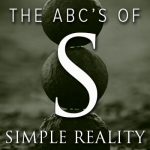 Silence is one of the three elements of the formula for how a life centered in P-A is lived.
Silence is one of the three elements of the formula for how a life centered in P-A is lived.
That formula is: S + S + S = S
simplicity plus solitude plus silence equals serenity
.
You talk when you cease to be at peace with your thoughts.[i]
— Kahlil Gibran
Meister Eckhart said that there is nothing in the world that resembles God so much as silence. Silence surrounds every beautiful sound, or we could not experience it. Perhaps that is why meditation is the universal practice used to approach and experience reality or the still, silent voice within. Even thought forms are a type of “noise.” Serenity, joy and love are “feelings” found in the present moment because they are our essence, they compose our natural state of being—the field out of which all form emerges.
Silence is very difficult to attain in the modern world. Contemplatives have found the courage to turn from the outside world where the senses are enthralled to their interior space to explore a world apart from the preoccupations of the body, the security of the mind and the sensations of the emotions.
Thinking and talking can be one of the many strategies that we employ as a way of distracting ourselves from the existential pain of P-B. All strategies which involve behaviors in the seeking of security, sensation and power we know to be futile. Silence, however, is a path that leads to inner peace. “In May 1957, Jung wrote to Gustav Schmaltz saying that solitude was for him ‘a fount of healing’ which made life still worth living. ‘Talking is often a torment for me and I need many days of silence to recover from the futility of words.’”[ii]
The simple act of quieting the mind, becoming silent, focusing on our inner calm will allow the Simple Reality of our natural state to emerge. “Place yourself in the middle of the stream of power and wisdom which animates all whom it floats, and you are without effort impelled to truth, to right and a perfect contentment.”[iii] This is how Emerson described the effect of silence.
The relationship between evolution and context is instructive at this point. A child is born with the capacity to learn language but if there is no one in the environment speaking language, that capacity will not be realized and the child will remain mute. The research of Joseph Chilton Pearce supports the importance of the evolutionary readiness as well as willingness of humanity to transcend its current narrative and behavior.
Before humankind or any other aspect of creation for that matter could evolve, the necessary environment had to exist. For example, our brain is a three-part physical organ. Before it could evolve from the reptilian brain (the inner core of our brain) to the limbic brain, the necessary evolutionary environment had to exist. Before the limbic brain (the simple sensory-motor brain focused on survival) could evolve to having the ability to think and have emotions, nature’s program for that shift had to be evolved. The neo-cortex, the third part of our brain gave us our potential to “feel” sympathy and to do creative thinking.[iv]
We now have the potential to transcend to the next level of human consciousness which will enable us to live on this planet in a sustainable manner. The context that will support that shift is P-A. The practice that will support each individual involves resisting our conditioned reactions and entering into the ineffable space that is surrounded by silence by responding to the life we have been given.
There are those among you who seek the talkative through fear of being alone. [v]
The poet Kahlil Gibran had the same insight the mathematician Blaise Pascal had centuries earlier.
All of man’s problems can be traced to the fact that he cannot sit quietly alone in a room.
Perhaps it’s time for all of us to get quiet!
[i] Gibran, Kahlil. The Prophet. New York: Knopf, 1923, p. 60.
[ii] Brome, Vincent. Jung: Man and Myth. New York: Atheneum, 1981, p. 263.
[iii] Emerson, Ralph Waldo. The Portable Emerson. New York: Viking, 1946, p. 192.
[iv] Pearce, Joseph Chilton. “Evolution’s End.” Science of Mind. Los Angeles: June 1993, p. 35.
[v] Gibran, op. cit.


